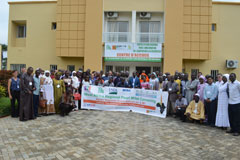September 18, 2018
K-State innovation lab co-hosts regional millet convening in West Africa
Submitted by Kira Everhart-Valentin

Nearly 90 researchers and stakeholders from across the West Africa pearl millet value chain came together at a regional convening Sept. 4-6 in Thies, Senegal. Targeted at major actors in pearl millet from Senegal, Niger, Mali and Burkina Faso, the event was co-hosted by Kansas State University's Feed the Future Innovation Lab for Collaborative Research on Sorghum and Millet, the Centre d’Etude Régional pour l’Amélioration de l’Adaptation à la Sécheresse, and the U.S. Department of Agriculture's NCBA CLUSA's Millet Business Services Project.
The objective of the convening was to provide a forum for the exchange of needs and opportunities by pearl millet stakeholders — including input suppliers, farmers, processors, etc. — with agricultural researchers focused on technological innovation. Over three days, the participants presented current pearl millet value chain activities in several West African nations and discussed technological bottlenecks to improved productivity and profitability of their activities. The groups broke out across subareas and worked together to prioritize the most pressing issues in the West African pearl millet industry. The findings from those breakout groups will be made available publicly and will be used to drive future research in the area.
Pearl millet is a staple crop across West Africa, particularly in the semi-arid areas of the Sahel. Its hardiness and drought tolerance make it particularly adapted to the challenging Sahelian climate, and its nutritive content and versatility make it a key foundation to diets for humans and animals alike. Growth in urban populations and average household incomes across the region has also led to an increasing demand for millet-based food products that are both nutritious and easy to prepare, offering new opportunities for entrepreneurs and businesses. The Sorghum and Millet Innovation Lab and other partnerships hope to harness these opportunities to contribute to the establishment of new initiatives aimed at improving both food and income security in the region.
The Feed the Future Innovation Lab for Collaborative Research in Sorghum and Millet is a consortium of cutting-edge research aimed at improving the adaptation and resilience of sorghum and pearl millet to the semi-arid climates of East and West Africa. It was established in July 2013 at Kansas State University to contribute technologies and knowledge toward the adaptation, resilience, and improved profitability of sorghum- and millet-based production systems and value chains through a grant from USAID as part of Feed the Future, the U.S. Government's global hunger and food security initiative. The lab links U.S. and international universities and research organizations in a collaborative effort to build human and institutional capacity in Ethiopia, Niger, Senegal, Burkina Faso, Mali and Haiti to make sorghum and pearl millet the crops of the future. Additional information regarding the Lab can be found at k-state.edu/smil.